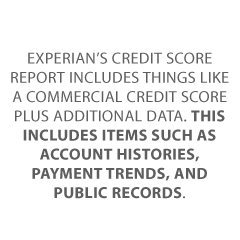A Good Business Credit Score Can Be Yours
So, what is a good business credit score?
A Good Business Credit Score
So you are currently in business, and you are working hard to get a good business credit score.
Or maybe you aren’t, but you feel now is a good time to start. Or maybe your small business is fairly new, and this is the first time you’re doing this.
Regardless of your scenario, you have probably been asking this question at least once. Do I have a good business credit score?
Let’s check out at the three business credit reporting bureaus and solve this mystery at long last.
Your Business’s Experian Company Credit Score
Experian’s Credit Score report includes things like a commercial credit score plus additional data. This includes items such as account histories, payment trends, and public records.
Experian business credit scores run from 1 to 100. Unlike Dun & Bradstreet’s PAYDEX score and Equifax’s payment index, Experian considers a number of factors. They don’t just look at payment histories.
Experian Scoring Elements
The elements which go into the calculation include:
- Lines of credit your company has applied for in the last nine months
- New lines of credit launched in the last six months
- Your company’s years in business
- Payment history in the prior twelve months
- Lines of credit in use in the last six months
- Collections amounts in the past seven years
- Percent of available credit in use
- Amount of payments one – 30 days overdue, or 31 days or more late
- Amount of non-net-30 lines of credit (that means the payment is due in less or greater than 30 days).
Generally, even small businesses that use credit responsibly will get a medium-low risk rating. As you might expect, older small businesses will have an easier time getting a low-risk rating.
A decent Experian score for your small business is 76-100.
Your Small Business’s PAYDEX Score
Dun & Bradstreet’s PAYDEX score ranges from 0 to 100. A PAYDEX score comes from payment information. This is either reported to the CRA or to data-gathering companies partnering with the CRA.
D & B uses this information, and a credit score and financial stress score. This is to recommend how much credit a lender should extend to your business.
To have a PAYDEX number, you must file for a DUNS number via Dun & Bradstreet’s web site. The number is free.
In addition the agency must have reports of your payments with four or more vendors. Your business’s PAYDEX score shows if your payments are generally made on time or ahead of schedule.
As you might expect, a greater number is better. The scores are:
- 80-100: A low risk of late payments
- 50-79: A medium risk of late payments
- 0- 49: A high risk of late payments
Credit Rating
Your small business’s credit rating ranges from 1 to 5. 1 is the best score. This matches your company with other companies with similar payment histories.
The figure reveals how often those businesses tend to pay without delay. The data can help creditors understand your company’s standing. But it does not genuinely reflect the payment data from your business.
Financial Stress Score
The financial stress score also runs from 1 to 5. This score matches your company with other small businesses sharing comparable financial and business properties. These similarities are in areas like size or amount of time in business. This score demonstrates how frequently those companies tend to pay on time.
As before, 1 is the best score. This rating is a broader evaluation of the business landscape, versus an analysis of your company’s authentic payment history.
A good PAYDEX score for your business is 80-100.
Your Company’s Equifax Score
Equifax displays three separate business determinations on its commercial credit reports. These are the Equifax payment index, your business’s credit risk score, and its business failure score.
Much like the PAYDEX score, Equifax’s payment index, which is measured on a scale of 100, shows how many of your company’s payments were made in a timely manner. These include both data from creditors and vendors. However, it’s not meant to forecast future actions, which is what the other two scores are for.
Equifax Credit Risk Score
Equifax’s credit risk score assesses how likely it is your small business will become severely delinquent on payments. Scores range from 101 to 992, and they determine:
- Available credit limit on revolving credit accounts, e. g. credit cards
- Your business size
- Proof of any non-financial transactions (e. g. vendor invoices) not unpaid or charged off for two or more billing cycles
- Length of time since the opening of the oldest financial account
Equifax Business Failure Score
Lastly, Equifax’s business failure score looks at the chance of your small business closing. It ranges from 1,000 to 1,600, evaluating these aspects:
- Total balance to total current credit limit average utilization in the previous three months
- The length of time since the oldest financial account was opened
- Your small business’s worst payment status on all trades in the past 24 months
- Evidence of any non-financial transactions (e. g. vendor invoices) which are late or have a charge off for two or more billing cycles
For the credit risk and the business failure scores, a score of 0 means bankruptcy.
A good Equifax score for your business is as follows:
- Payment Index 0-10
- Credit Risk score 892-992
- Business Failure score 1400-1600
Raising Your Business Credit Scores
Now that you know what the good scores are, it’s time to think about how to raise yours.
Improving your company credit scores will make it easier for you to get loans and credit, and you will get better terms for both.
It can also mean the difference between wanting business credit and loans, and not getting them at all. So here are three basic methods to improve your small business credit scores.
3. Do Your Best to Improve Your Payment History
How do you make your company’s payment history better? It’s simple. Just pay your bills in a timely manner, and as close to ‘in full’ as you possibly can. That can be easier said than done.
The truth is, in the same manner that you need to keep your own personal spending within your means, you also must keep your company spending realistic.
No one can foresee the future. All anyone can do is to go by whatever data is available. Plus it should be analyzed in a way that is not excessively optimistic.
For new companies, that should mean evaluating industry trends. For more businesses that are not so new, it means meticulously inspecting your business’s performance. This ought to be under all types of conditions.
2. Credit History Length Matters
This is basically for how much time your business has been utilizing small business credit. Naturally newer companies will have short credit histories. While there is not too much you can particularly do about that and there’s no real hack for that, in itself, do not lose heart.
Credit reporting bureaus will also review personal credit history and your very own history of payments. If personal credit is good, and particularly if you have a fairly long credit history, then personal credit can come to the rescue of your corporate.
Of course the reverse is also true. If your personal credit history is poor, then it will influence your corporate credit scores until your business and personal credit can be split up.
1. Stay on Top of Your Small Business Credit Scores
This means frequently getting and reviewing both your small business and consumer credit reports. This is because, for new companies and sole proprietorships, credit agencies will often look at your consumer credit as well.
That’s why, you will need to stay on top of both sets of scores, since credit scoring reports can have inaccuracies and you have the right to dispute them. However, you will not know there are any inaccuracies unless you check.
Focus on your company credit scores and the overall financial health of your business and you will be a lot more likely to succeed.
A Good Business Credit Score Can Be Yours
Finally, keep your numbers up and you will have a good business credit score. Learn more here and get started toward building business credit attached to your company’s EIN and not your SSN.

